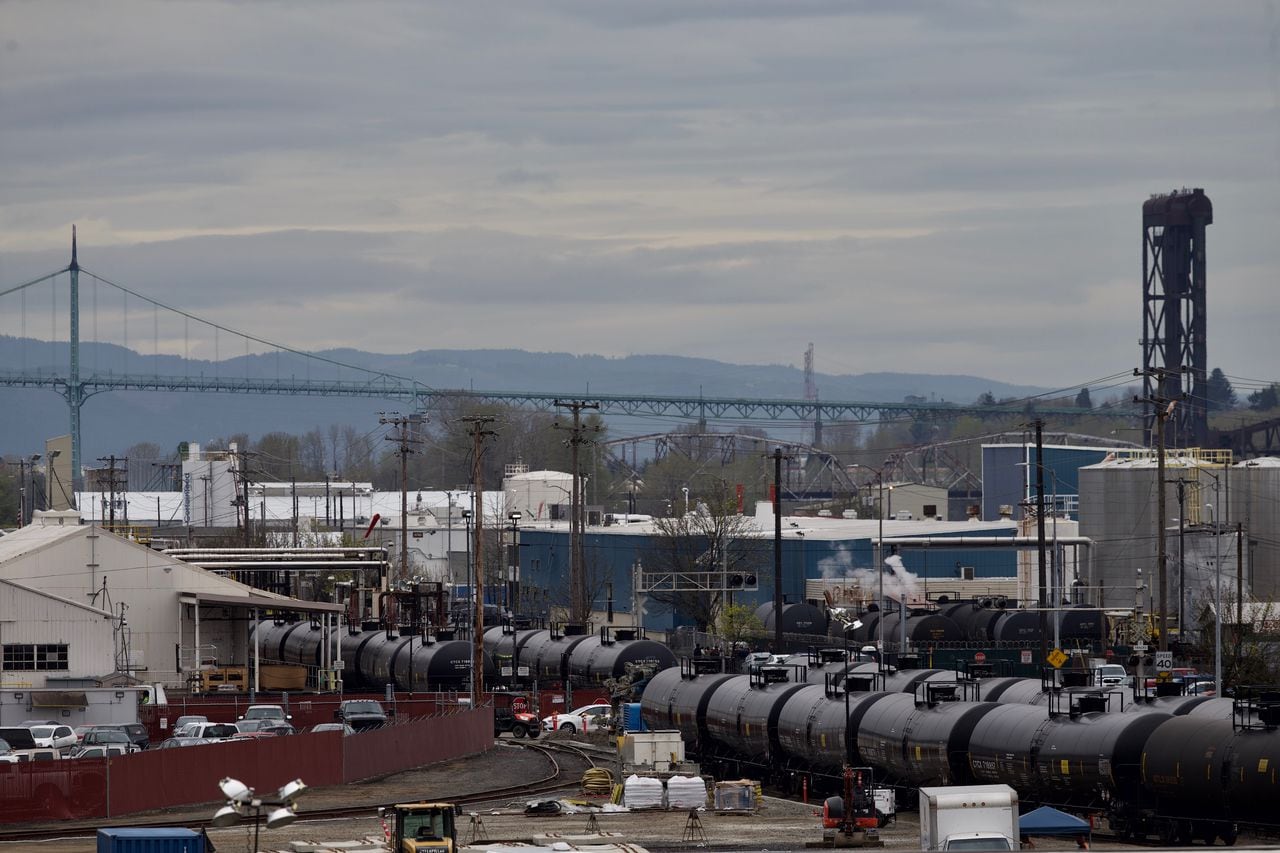Zenith Energy has once again increased the amount of crude oil and diesel that it moves through its Portland rail terminal.
About 374 million gallons passed through the terminal in Northwest Portland last year compared to 337 million gallons the year before, according to a recent report by Zenith to the Oregon Department of Environmental Quality. That equals well over 100 trains per year.
Houston-based Zenith, which offloads and stores fuels at its Northwest Portland site before transferring them to ships bound for refineries and markets elsewhere, disclosed the increase as part of its annual reporting under its state air quality permit.
Reports filed with Oregon’s DEQ in previous years show steady increases in fuel moved since 2019. That’s despite Zenith’s 2018 promise to Oregon regulators that a planned expansion of its terminal would not lead to such an increase. At the time, Zenith added more unloading racks and nearly quadrupled its capacity to unload rail cars simultaneously, from 12 to 44 cars.
The increase in fuel volume heightens the likelihood and severity of fires, explosions and spills resulting from train derailments or seismic events, said Audrey Leonard, staff attorney with Columbia Riverkeeper, an Oregon nonprofit dedicated to protecting the Columbia River.
The Ohio train derailment and fire earlier this month has raised major questions about the safety of transporting hazardous chemicals by rail. And environmentalists have for years raised alarm about the risk of transporting crude oil and other fuels in the Pacific Northwest. One such accident occurred in 2016 when a train hauling several million gallons of crude oil derailed and caught on fire near Mosier, spilling oil into the Columbia River.
Grady Reamer, Zenith’s vice president of West Coast operations, said the increase was a temporary response to market demands but Zenith planned to scale back on crude oil moving forward.
“Coming out of COVID, our customers increased their volumes to address growing demand on the West Coast,” said Reamer via email. “After our agreement with the City in October 2022, we expanded our renewable fuel storage capacity and have begun reducing our crude oil infrastructure.”
Zenith’s latest report also shows an increase in toxic pollutants released during transport and unloading – most notable is an increase in VOCs or volatile organic compounds, which are harmful to human health and contribute to the formation of ground-level ozone.
Reamer said that while emissions did increase, the company is at 28% of its permitted emissions levels.
He said Zenith planned to decrease future emissions under a new DEQ permit application pending review. Leonard of Columbia Riverkeeper said it was unclear if such a decrease was possible, given that it requires high level blends of renewables.
Environmental advocates said the increase in crude and diesel moving through the Portland terminal calls into question Zenith’s deal with the city to phase out crude oil. Last October, Zenith received a controversial stamp of approval from the city known as a Land Use Compatibility Statement for five more years of oil storage and transfer after promising it would transform into a “renewable fuels” company.
Zenith said 28.5% of its current storage capacity is now being used for renewable fuels, namely renewable diesel.
Reamer said the company expected that percentage to grow to 38% by the end of this year “based on discussions we’re having with our customers.”
If the demand for renewable fuels grows faster than the five-year timeline, he said, the transition to renewables will be faster.
Activists have continued to press Portland officials to revoke permission for Zenith to operate. But at a City Council meeting earlier this month, Commissioner Carmen Rubio said the city doesn’t have the authority to rescind the land-use agreement and that Zenith’s move to renewables aligns with the direction Portland is taking toward cleaner fuels.
Rubio said Zenith’s increase in the amount of crude it moved last year would not change that decision.
“Nothing has changed with our expectations that Zenith phase out crude in five years. They are aware of that, and that they need to keep updating us over that time,” Rubio said in a statement to The Oregonian/OregonLive.
She added that Zenith’s recent increase in moving renewable fuels is “the progress we’re looking for – and that we expect to continue.”
BY THE NUMBERS
Zenith Energy’s reports show the company has steadily increased the amount of crude oil and diesel that moves through its Portland terminal. Below are estimates for each year:
- 2019: 167 million gallons
- 2020: 235 million gallons
- 2021: 337 million gallons
- 2022: 374 million gallons
– Gosia Wozniacka; gwozniacka@oregonian.com; @gosiawozniacka
Our journalism needs your support. Please become a subscriber today at OregonLive.com/subscribe/
